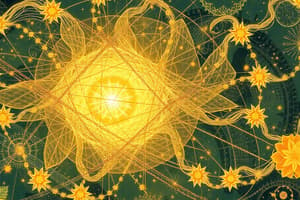Podcast
Questions and Answers
According to Newton's 3rd Law, what occurs for every action?
According to Newton's 3rd Law, what occurs for every action?
- The motion increases.
- There is no reaction.
- There is an equal and opposite reaction. (correct)
- The force is doubled.
Kinetic energy is the energy an object possesses due to its position.
Kinetic energy is the energy an object possesses due to its position.
False (B)
What is the principle of conservation of energy?
What is the principle of conservation of energy?
Energy cannot be created or destroyed, only transformed.
In a perfectly ____ collision, both momentum and kinetic energy are conserved.
In a perfectly ____ collision, both momentum and kinetic energy are conserved.
Match the term with its definition:
Match the term with its definition:
Momentum can be created or destroyed during a collision.
Momentum can be created or destroyed during a collision.
The equation for momentum is given by _____ = mass × velocity.
The equation for momentum is given by _____ = mass × velocity.
What happens to momentum during a collision?
What happens to momentum during a collision?
Which of the following best describes momentum?
Which of the following best describes momentum?
What is the equation for the law of conservation of momentum?
What is the equation for the law of conservation of momentum?
Momentum is conserved in an isolated system where external forces are present.
Momentum is conserved in an isolated system where external forces are present.
According to the law of conservation of momentum, the total momentum in a closed system remains _____ before and after an event.
According to the law of conservation of momentum, the total momentum in a closed system remains _____ before and after an event.
Match the situations with their conservation of momentum outcomes:
Match the situations with their conservation of momentum outcomes:
What happens to the car in front when it is rear-ended by another car?
What happens to the car in front when it is rear-ended by another car?
Momentum can be created or destroyed in a closed system.
Momentum can be created or destroyed in a closed system.
The momentum of the cannon and cannonball system before firing is equal to the momentum after firing.
The momentum of the cannon and cannonball system before firing is equal to the momentum after firing.
In a collision, what remains constant in an isolated system?
In a collision, what remains constant in an isolated system?
What is the formula for momentum?
What is the formula for momentum?
A truck moving at a velocity of 10 m/s has a momentum of ______ N·s if its mass is 3000 kg.
A truck moving at a velocity of 10 m/s has a momentum of ______ N·s if its mass is 3000 kg.
Match the following concepts with their definitions:
Match the following concepts with their definitions:
What principle explains why the sum of momenta before a collision equals the sum of momenta after collision?
What principle explains why the sum of momenta before a collision equals the sum of momenta after collision?
During a collision, a stationary object can gain momentum.
During a collision, a stationary object can gain momentum.
What is impulse in relation to momentum?
What is impulse in relation to momentum?
If a car with a mass of 1000 kg is moving at 15 m/s, its momentum is ______ N·s.
If a car with a mass of 1000 kg is moving at 15 m/s, its momentum is ______ N·s.
What happens to momentum when an object collides with a solid barrier?
What happens to momentum when an object collides with a solid barrier?
What is the formula for momentum?
What is the formula for momentum?
The total momentum of an isolated system can change due to external forces.
The total momentum of an isolated system can change due to external forces.
What concept describes the equal and opposite forces that two objects exert on each other during a collision?
What concept describes the equal and opposite forces that two objects exert on each other during a collision?
The equation for conservation of momentum can be expressed as _____ = _____
The equation for conservation of momentum can be expressed as _____ = _____
Match the following terms with their definitions:
Match the following terms with their definitions:
Which scenario would produce a higher force during a collision?
Which scenario would produce a higher force during a collision?
Impulse is represented by the symbol J.
Impulse is represented by the symbol J.
What is the relationship between force, impulse, and momentum as described in the impulse-momentum theorem?
What is the relationship between force, impulse, and momentum as described in the impulse-momentum theorem?
Velocity is a _____ quantity, meaning it has both direction and magnitude.
Velocity is a _____ quantity, meaning it has both direction and magnitude.
Which of the following best describes an isolated system in terms of momentum?
Which of the following best describes an isolated system in terms of momentum?
Flashcards are hidden until you start studying
Study Notes
Newton's Third Law
- For every action, there is an equal and opposite reaction.
- This means that forces always come in pairs.
Kinetic Energy
- Kinetic energy is the energy an object possesses due to its motion.
Conservation of Energy
- The principle of conservation of energy states that energy cannot be created or destroyed, only transferred or transformed.
Perfectly Elastic Collisions
- In a perfectly elastic collision, both momentum and kinetic energy are conserved.
Matching Terms to Definitions
- Momentum: The product of an object's mass and velocity.
- Kinetic Energy: The energy an object possesses due to its motion.
- Elastic Collision: A collision where both momentum and kinetic energy are conserved.
- Inelastic Collision: A collision where momentum is conserved, but kinetic energy is not.
Newton's Third Law
- For every action, there is an equal and opposite reaction.
Kinetic Energy
- Kinetic energy is the energy an object possesses due to its motion.
Conservation of Energy
- The principle of conservation of energy states that energy cannot be created or destroyed, only transformed from one form to another.
Elastic Collisions
- In a perfectly elastic collision, both momentum and kinetic energy are conserved.
Definitions
- Impulse: The change in momentum of an object.
- Power: The rate at which work is done.
Momentum and Energy
- Momentum: A measure of an object's mass in motion.
- Energy: The ability to do work.
The Law of Conservation of Momentum
- The total momentum of an isolated system remains constant: This means that momentum cannot be created or destroyed, only transferred between objects within a system.
- This law stems directly from Newton's Laws of Motion.
- Momentum is defined as the product of an object's mass and its velocity: p = mv, where p is momentum, m is mass, and v is velocity.
- The formula for the Law of Conservation of Momentum is p = p' or m₁v₁ + m₂v₂ = m₁v₁' + m₂v₂': This equation shows that the sum of the momentum of all objects in an isolated system (no external forces) is constant.
- Impulse is the amount of force applied on an object over a certain amount of time (J=FΔt), and it's equal to the change in momentum (J=mΔv=Δp): This is called the impulse-momentum theorem.
Real-World Applications
- A car collision: The sum of the momentums of the two cars before the accident is equivalent to the sum of their momentums after the accident.
- A pirate ship firing a cannonball: The momentum of the cannon and cannonball before firing is zero, and the momentum of the cannonball traveling horizontally at a specified velocity is compensated by the recoil velocity of the cannon.
- A truck hitting a parked car: The total momentum before the collision (truck moving) equals the total momentum after the collision (truck and car moving).
Example Calculations
- A 6000 kg truck moving at 10 m/s hits a 1000 kg parked car, causing it to move at 15 m/s: The truck's velocity after the collision can be calculated using the conservation of momentum equation.
- A cannonball fired from a pirate ship (given masses and velocities): The recoil speed of the cannon can be determined using the conservation of momentum principle.
Key Concepts
- Newton's Third Law: Every action has an equal and opposite reaction.
- Newton's Second Law: Force equals mass times acceleration (F=ma).
- Momentum is a vector quantity: It has both magnitude (amount) and direction.
Understanding Momentum
- A larger object moving faster has more momentum than a smaller or slower object.
- In a closed system, the total momentum stays constant even though individual objects may transfer it.
- In collisions, momentum is transferred between objects.
- Momentum is conserved even when an object stops (like a car hitting a brick wall), because the momentum is transferred to other objects (like the wall and the Earth).
Summary
The Law of Conservation of Momentum, a fundamental principle in physics, helps explain the movement of objects in a closed system. It states that momentum is neither created nor destroyed but is transferred between objects within a system. By applying this principle, we can analyze and calculate the movement of objects in various scenarios, from collisions to explosions.
Studying That Suits You
Use AI to generate personalized quizzes and flashcards to suit your learning preferences.




